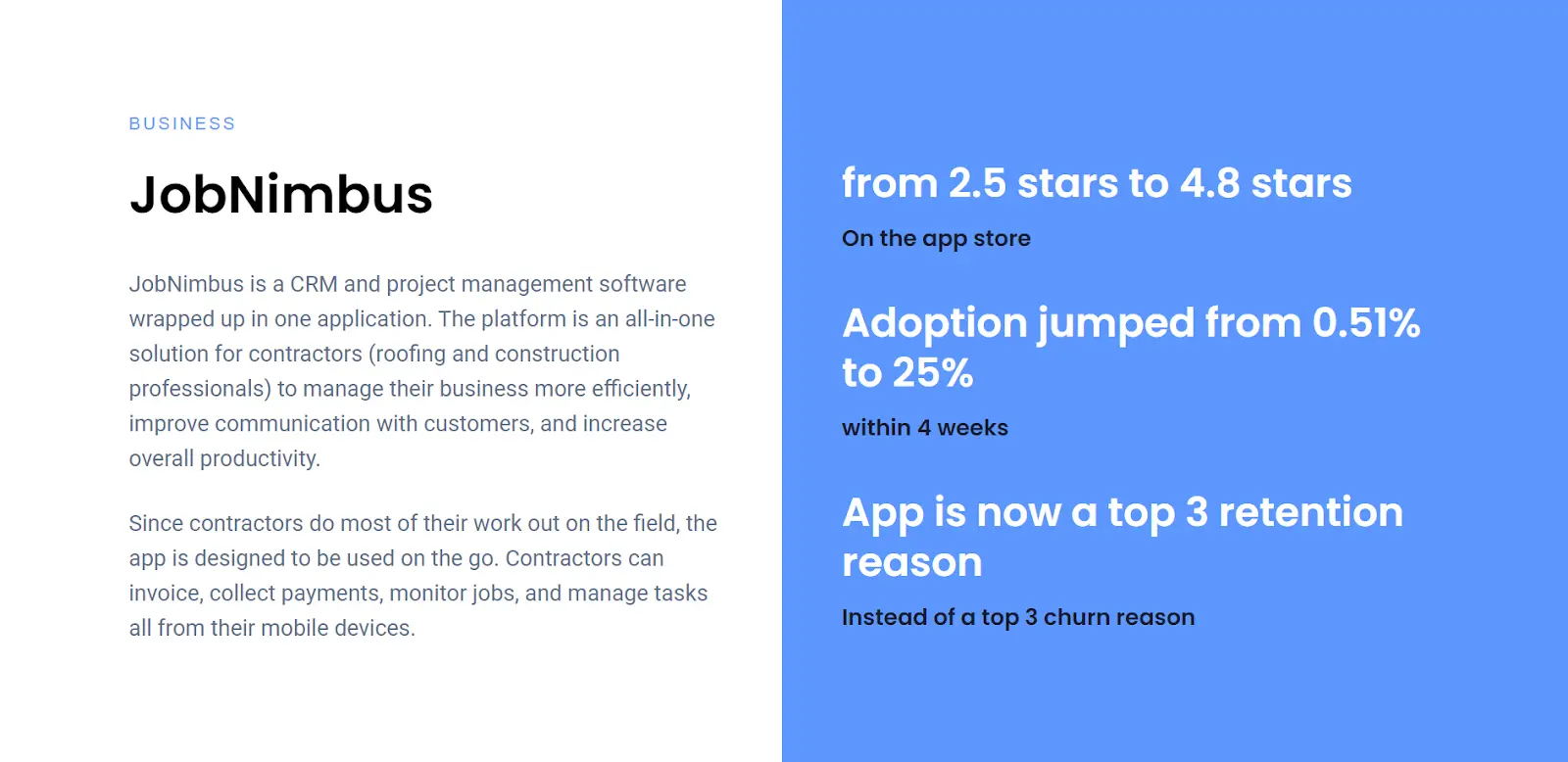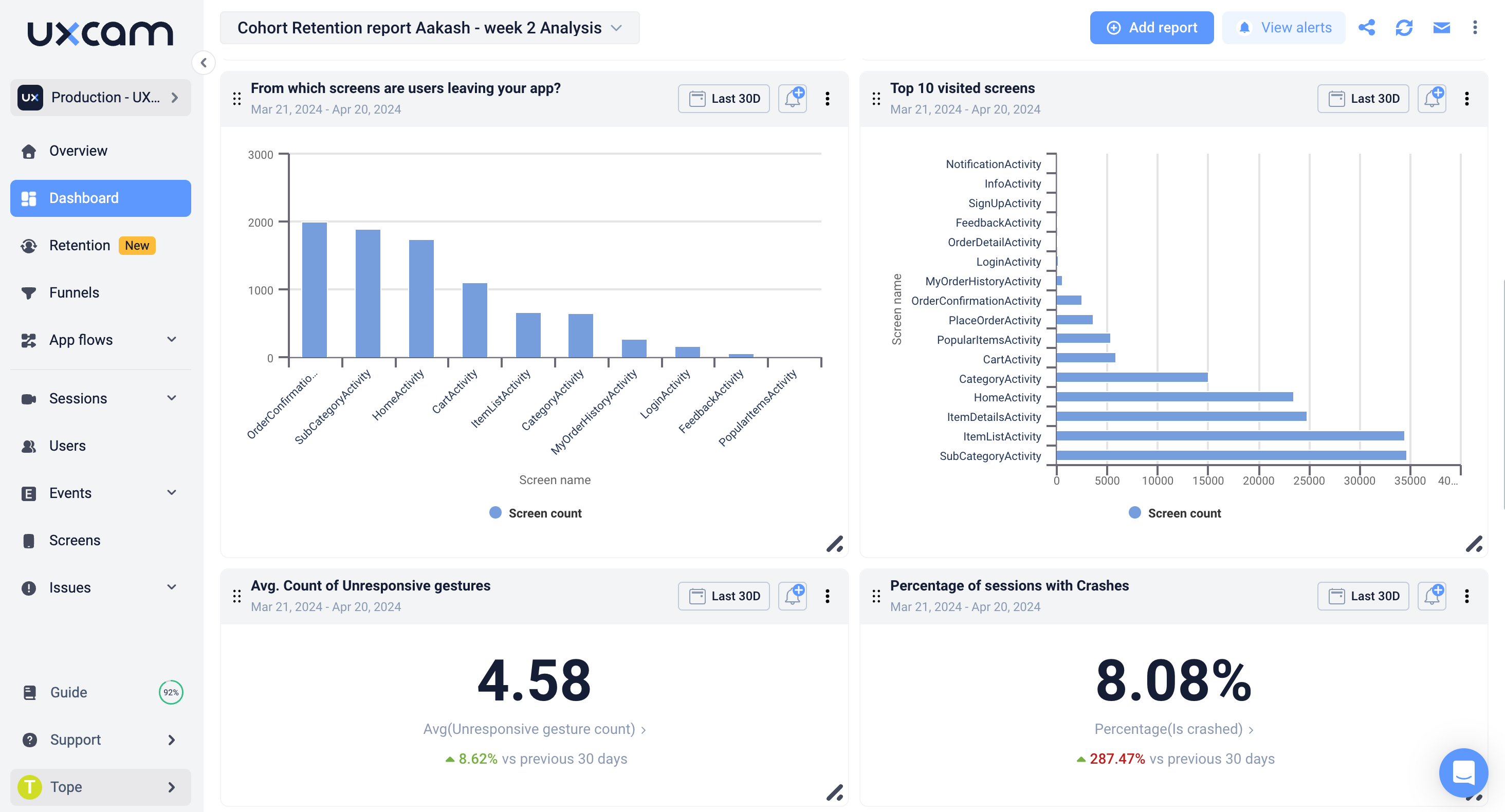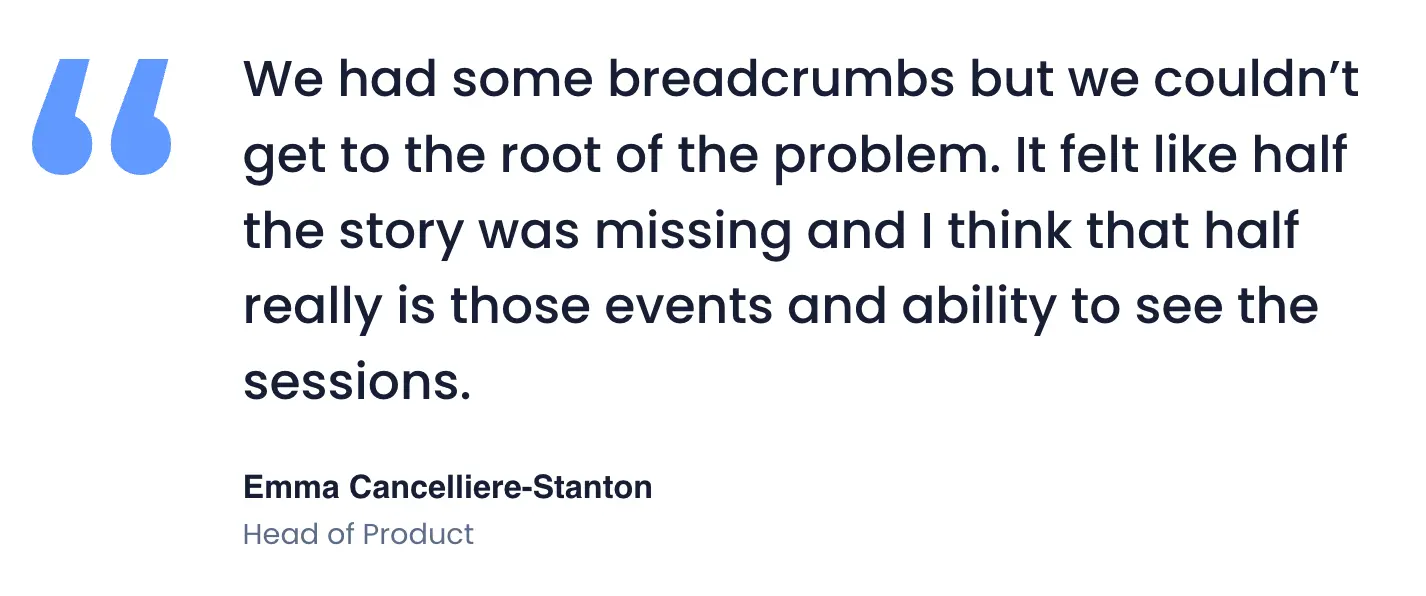User Adoption Strategy - How to Win & Keep Loyal App Users
Looking for some actionable user adoption strategies that you can start implementing right away? Are ready for some concerning stats?
Did you know the most recent research shows 25% of apps are used only once? And the average app loses 77% of daily active users just three days after installation?
These statistics highlight just how hard it is to get users to adopt your product long-term.
At UXCam, we’ve helped 37,000+ companies improve their apps and increase user adoption. Our experience has taught us that there are certain strategies and tactics that consistently work, regardless of industry or company size. We understand that boosting user adoption is a complex process—and we’re here to help you make it easier. We’ve compiled our best practices for increasing user adoption below, so you can start seeing better retention and engagement rates.
So, whether you’re a startup looking to gain traction in the market or an established business trying to retain your customer base, we’ve got you covered.
Let’s get started.
Helpful summary
Overview: This article discusses best practices for increasing user adoption and driving growth for your product or service.
Why it matters: User adoption is important for customer retention and reducing acquisition costs.
Action points: We recommend implementing a mobile analytics solution like UXCam to understand what is driving (and hindering) user adoption.
Further research: Check out our guide to user adoption tools for insights into what works for other successful businesses.
What is user adoption?
User adoption is the process of new users first becoming familiar with and then regularly using an app.
In practice, user adoption begins immediately after a user installs an app for the first time. They’ll work through your onboarding flow, become familiar with key features and interfaces, and ultimately decide whether to continue using the app based on the amount of value they perceive.
It’s a delicate process that—as the statistics we covered earlier show—many apps struggle with. The good news is that tons of product teams have used data-driven insights and thorough analytics to improve their apps’ adoption rates.
User adoption example - JobNimbus
JobNimbus is a project management software for construction teams. The product team was struggling with extremely low mobile app adoption and turned to UXCam’s analytics suite to uncover the reason.

The team used UXCam’s modular dashboards and pre-built reports to track key metrics like:
Feature adoption rate
Monthly active users
Cash-free session rate
Device model distribution
Metrics like these gave the team easy access to insights that guided their app redesign in a more user-centric direction. They were able to see the impact of each change they made, and reliably identify the “whys” behind user behavior.
The result? A 25% increase in user adoption in just four weeks.
How to increase user adoption (best practices)
Set up user behavior tracking
Build user adoption dashboards
Identify and fix “minor” issues
Use qualitative feedback
Step 1 - Set up user behavior tracking
Data-driven development is the secret to long-term success. When you have data on when, how, and why users use your app, you can build and optimize features and flows that make the experience more engaging and useful for them.
UXCam is an all-in-one mobile analytics tool that allows you to collect this data.
Our lightweight SDK integrates with your app in minutes and collects a wide range of data on user behavior. Tagless autocapture lets us track every single interaction that happens in your app—regardless of whether you’ve tagged it or not.
Once you’ve started collecting data, we also offer a suite of analysis tools, including:
Session replay
Heatmaps
Screen flows
Event logs
Smart events
Segmentation
Funnels
Retention analysis
… and more.
Step 2 - Build user adoption dashboards
Dashboards are designed to give you and your team easy access to data.


Building user adoption dashboards allows you to keep a finger on the pulse of your user base and track any changes in adoption rates following updates, marketing campaigns, feature releases and more.
When building a user adoption dashboard, consider including metrics like:
DAU
MAU
User retention rate
Feature usage
Session length
UXCam gives product teams complete freedom to design dashboards that fit their specific needs and goals. With hundreds of pre-built reports, the ability to build custom reports, and a modular design, you can track the metrics most important to your product's success.
Step 3 - Identify and fix “minor” issues
Minor issues aren’t always as minor as they seem—in fact, they can be major roadblocks to user adoption.
An example? Consider Recora—a UXCam customer that offers a post-treatment cardiac recover app.
The team was getting tons of support tickets complaining of bugs that didn’t seem to exist. They used UXCam’s session replays to zoom in on affected sessions and found the issue—users were pressing and holding a button that was programmed to be tapped.

Fixing this “small” issue led to a 30% reduction in user frustration signals.
No matter how careful you are during development and testing, your app is bound to have small but impactful issues like this. While they aren’t usually deal-breakers for users in isolation, they compound to create a negative user experience that can ultimately lead to abandoned apps and low adoption rates.
To find and fix these issues:
Set up funnels for key flows (onboarding, purchase, etc.) to identify where users are dropping off.
Create segments for users that do and don’t adopt your product to compare behaviors.
Use session replays and heatmaps to see exactly how users are interacting with those key flows and pinpoint any issues or pain points.
Step 4 - Use qualitative feedback
Numbers are powerful, but they can’t always capture the full story. High-quality user feedback can guide you to understand why users are dropping off or not adopting your product.
Some ways to gather qualitative feedback include:
Churn surveys: Send out surveys to users who have cancelled or stopped using your product to gather insights on why they left.
In-app surveys: Prompt users for feedback at moments that offer insight into adoption—when they complete a key action, for example.
Customer support tickets: Review customer support tickets to identify recurring issues or pain points that users are facing.
User interviews: Set up one-on-one interviews with users to dive deeper into their experiences and gather valuable insights.
It’s important to note that qualitative data is less reliable than quantitative data, in the sense that anecdotal experiences don’t always capture a trend. Don’t fixate on isolated experiences—look for patterns in the qualitative feedback you collect, and validate those patterns with quantitative data.
Why user adoption strategies are important?
Enhanced customer retention
SEMrush highlights that 89% of companies recognize excellent customer service as pivotal for customer retention. Boosting customer retention by just 5% can result in profit increases ranging from 25-95%.
Cost-efficient user acquisition
Increased user adoption generally results in a reduced cost of acquiring new users, facilitated by existing users actively promoting the product through word-of-mouth and other organic means.
According to a Nielsen study, 92% of consumers place greater trust in recommendations from friends and family compared to conventional advertising.
Savings in marketing costs
It's 6-7x more expensive to acquire new customers than to retain existing ones. Focusing on user adoption and retention can significantly slash marketing and retention costs for businesses.
Conclusion
User adoption is an important aspect of any successful product or service. By understanding and actively seeking feedback from your users, you can gain valuable insights that will help you improve and optimize your user adoption strategy.
At UXCam, we arm you with the tools and resources to gather user feedback and make data-driven decisions for your product. From heatmaps and user session recordings to retention reports, we have everything you need to understand your users’ experiences and drive adoption.
Sign up for a free trial and unlock valuable insights to optimize your user experience.
You might also be interested in these;
5 Most important user adoption metrics to track and measure
Product adoption dashboard - How to track adoption metrics
5 KPIs to measure your new feature adoption
Stages of the product adoption orocess - An indepth guide
AUTHOR
Tope Longe
Product Analytics Expert
Ardent technophile exploring the world of mobile app product management at UXCam.

Related articles
Tool Comparisons
UXCam vs Amplitude: A real comparison for mobile product analytics
Compare UXCam and Amplitude for mobile product analytics. See where event-based metrics work, where they fall short, and how UXCam's AI-powered product analytics platform reveals what's actually happening in your...

Begüm Aykut
Growth Marketing Manager
Product best practices
App Onboarding Guide: Top 10 Onboarding Flow Examples 2026
Take a look at 10 examples of apps that get user onboarding flows right. Get inspired by proven app onboarding approaches and improve your...

Jonas Kurzweg
Product Analytics Expert
App Analytics
Mobile App Tracking: Practical Guide & Best Tools [2026]
The best tracking tools for mobile...

Jonas Kurzweg
Product Analytics Expert

